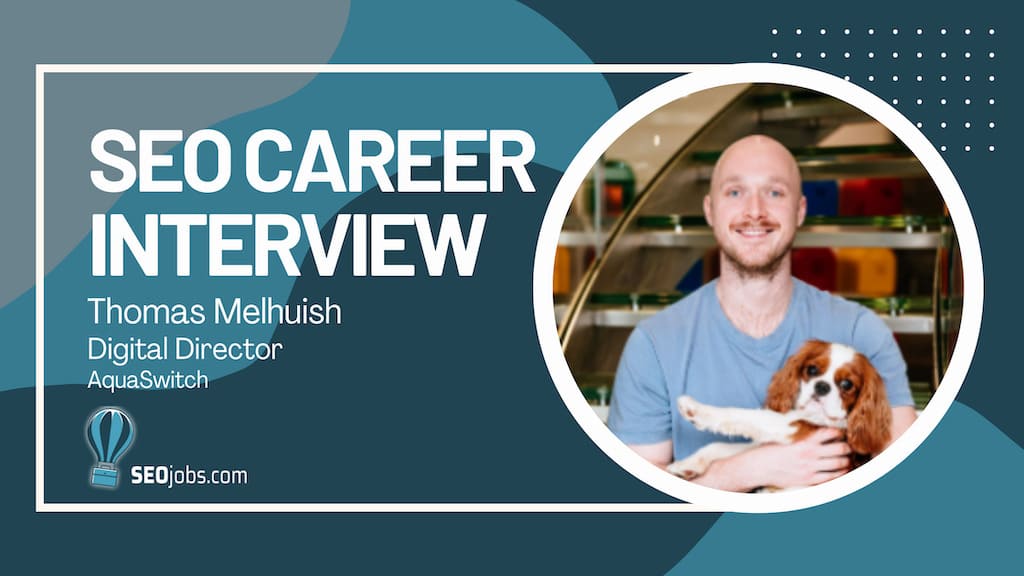Welcome to the SEO Careers interview series. This week, we’re excited to welcome Thomas Melhuish, Digital Director at AquaSwitch, which is a UK utility comparison website. Thomas has over 3 years experience in SEO, and can be found on Twitter & LinkedIn here.
If you are interested in being featured in the SEO careers interview series, please submit your name and contact details on our contact page.
We appreciate Thomas joining us this week – let’s jump into the interview!
Hi! We’re so glad to feature you on SEOjobs.com. Please introduce yourself to our site’s readers.
Hi, my names Tom Melhuish and I’m based in London, England. I’ve been in the SEO industry for just 3 years. Pretty new to it compared to most!
Please share with us your current SEO role and for what company you work for.
I work for AquaSwitch, a business price comparison website. I’ve been here since 2020 (Initially part-time) until September 2021, when I moved into a full-time role.
My role at AquaSwitch oversees the full digital marketing scope including the SEO and the CRM strategy. I manage a team of two content writers.
The SEO strategy is our key customer acquisition strategy as it allows us to compete with the big players in our market with no-direct cost. We are steadily building our presence within the market through ever improving SEO performance.
One of the key aspects of the role is to build the SEO strategy for the next few years whilst being agile and accommodating changes in the way people search to ensure we compete with the best.
We are building the strategy on the base of high-quality useful information that educates potential customers and builds trust. With the ultimate goal of them becoming a customer of ours.
Can you share with us how you entered the SEO industry?
I did go to university at the University of West of England to study business and statistics (the latter being the only useful part of it).
The business side of it was focused on history and historical processes with no progressive information. There you go, the 7P’s and a PowerPoint presentation, “Marketing”. Not helpful one bit. But that didn’t put me off.
Before moving into SEO, I worked in digital marketing on the retention side, building CRMs and automation. And before that, in 2012, I had a brief cameo as a failed estate agent (US translation: Realtor).
I entered the world of SEO in January 2020 when I began to build a film blog teaching myself along the way. But, it kicked off in June 2020 when Ben (AquaSwitch Founder) reached out to me about the potential of building an SEO-focused business comparison website.
I was able to show the success I’d had with my filmmaking blog through the SEO techniques I’d learnt in my spare time, and soon we started working together on building AquaSwitch.
From that moment, SEO became my core focus.
But the key tips I’d suggest to enter into the world of SEO are:
- Keep learning, SEO changes weekly
- Build your own projects
How did you start to learn SEO? What are you currently doing to keep up with the ever-changing SEO industry?
I fell into learning about SEO largely by accident. Initially, I was doing an online film course and began to learn the basics of filmmaking and editing. I found that there were not many step-by-step guides written on the basics of editing or how to standardise a script, for example.
I began writing a basic filmmaking blog with the things I learnt, and it quickly grew to about 30 guides. I then started to get visitors through WordPress from the blog update page. I then started to restructure the blogs and rework them after I came across Google Search Console and then pretty much got consumed day in and day out with learning the SEO basics and pairing them with useful, well-written guides.
I think the first guide I read was the Moz beginners guide, and then once I nailed the basics, I began to continue to learn what I’d class as the mid-level aspects of SEO.
Currently, to keep up with current trends, I’ve signed up to blog for the following:
- Search Engine Journal
- Andy Cresodina (He’s more of a 360 marketer, but his insight are invaluable) – Great for UX tips and keeping people engaged and improving conversion rates.
- For general changes, Moz and SEMRush.
- Of course, Neil Patel’s newsletter.
Then I follow these on LinkedIn; they provide incredibly good insights:
Finally, I always check on Google Search for updates and changes and John Mueller.
What recommendations would you give to someone who is looking to join the SEO industry and get their first full-time SEO position?
Learn by trial and error. Have factual proof. In my opinion, the best way to learn is:
Set yourself up with a free blog on WordPress and buy a 99p domain and begin to learn the basics. SEO is always changing, and you need to be up to date with the latest methods. Start small, and build out the basics.
Once you’ve nailed the basics and can see some growth, you can then start to scale it up. Create new pages, and new topics and review performance. Begin to reach out to collaborate with others and build an audience.
When you start to get a little bit of traffic, retain the audience. Maybe offer them something for free if they sign up for your newsletter. That way, you start to build a brand, you retain the readers, and as you acquire new traffic, you start to build an audience.
It’s the best way to learn SEO. The theory will only take you so far. Although the basic technical aspects are the same for business to business and most industries. There are a lot of things that won’t work from company to company
You sometimes have to A/B test different page setups to understand how your organic traffic interacts with a landing page.
A great example is:
If someone has landed on a page to find out what “The deregulated water market is”. They’re looking for information and are unlikely to transact. You may want to use this page to build your database, as they’re right at the start of the funnel.
They are at a different stage to someone who’s looking to “Compare business water suppliers”. This page will want to be concise, answer key questions, and immediately give the ability to the user to search and compare against different suppliers in order to convert the traffic.
Overview:
- Build your own project to learn the basics
- Figuring it out yourself first
- One size doesn’t fit all – try and test different strategies, then monitor over the coming weeks and months to make tweaks and changes to improve
- Reporting is key – it shows you what is working and what isn’t. Find out why it’s not working and slowly tweak with the successful strategies and scale up
Key people to follow:
Key resources to start initially with:
– Moz Beginners Guide

